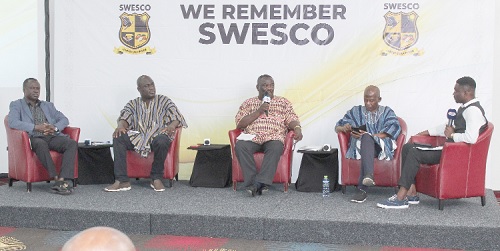
Form national farmers union to promote agriculture —Prof. Kanton
A former Research Scientist with the Savannah Agricultural Research Institute (SARI) of the Council for Scientific and Industrial Research (CSIR), Professor Roger Kanton, has proposed the formation of a national union of Ghanaian farmers to push for better agriculture policies and support systems for farmers across the country.
He said the body must be non-partisan and composed of the various agriculture value chain actors who would be united in pursuit of a common goal of addressing the bottlenecks in the sector.
Additionally, he said, the union needed to have national, regional and district offices across the country devoid of external influences.
Prof. Kanton made the call when he delivered a public lecture at a forum organised by the alumni of Swedru Senior High School (SWESCO) last Monday to discuss the state of the country’s agriculture.
The forum, which was dubbed: "Swedru Conversation", was held on the theme "Feeding ourselves as a nation; perspective on revolutionising our agricultural fortunes".
Revolutionary policies
Prof. Kanton observed that given that the agriculture sector contributed more than 20 per cent to the country’s gross domestic product (GDP) and was the mainstay of the economy, it was important for revolutionary policies that placed the farmers at the centre to be rolled out.
In that regard, he called on the government to scrap taxes on the importation of agricultural machinery and equipment to make it easier for importers to bring in modern machinery and equipment to boost agriculture.
He said such a policy would help farmers to make a transition to mechanised agriculture and improve their productivity.
The agriculture expert also advocated a policy that would ensure the establishment of a fertiliser manufacturing company in the country to boost local production and supply the input to farmers.
He stressed the need for proper and functional irrigation schemes, dedicated funds for agriculture research, climate-smart policies and robust extension services to help revolutionise the agriculture sector.
Radical transformation
An associate professor in soil fertility at the Soil Science Department of the University of Cape Coast, Prof. Kwame Agyei Frimpong, stressed the need for radical transformation to help rebrand the agriculture sector.
He said the time had come for agriculture to be viewed as a sustainable business that required deliberate investment.
Prof. Frimpong said progressive agriculture policies must be targeted at investment in the value chain and development of infrastructure for the storage and distribution of agricultural produce.
Agriculture education
For his part, a Professor at the Department of Agriculture Economics and Extension at the College of Agriculture at the University of Cape Coast, Prof. Festus Annor-Frimpong, said revolutionising agriculture was a call to prioritising the production and consumption of local food.
He said it was worrying that apart from maize, yam, cassava and plantain that the country was self-sufficient in a chunk of the other food commodities were imported at exorbitant costs to the state.
